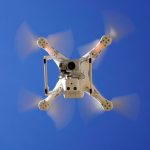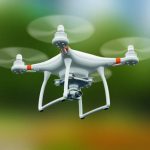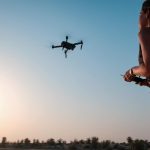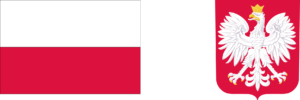Every flight performed with a drone in the Polish airspace must be reported to the Polish Air Navigation Services Agency (PAŻP) before it is performed. Technically, the notification should be made using the DroneRadar application available on mobile devices or the PAŻP website. After doing a ‘check-in’ on the app – which is coordinated with the PansaUTM system – there is a check of the availability of airspace in the intended flight area. If the airspace is open, the operator is informed that it is possible to perform a legal flight in the given situation.
The flight notification requirement was introduced by Article 15zzzzl of the Act of 16 April 2020 on specific support instruments in connection with the spread of the SARS-CoV-2 virus which read:
- During the period in which the Act is in force, operations of unmanned aerial vehicles may be carried out after the Polish Air Navigation Services Agency has been informed of the intention to carry out a flight via the teleinformation system specified by the Agency and in accordance with the conditions for carrying out flights specified in the Regulation of the Minister of Transport, Construction and Maritime Economy of 26 March 2013 on the exclusion of the application of certain provisions of the Aviation Law to certain types of aircraft and the determination of the conditions and requirements for the use of such aircraft (Journal of Laws of 2019, item 1497).
- A subsidy from the State budget shall be granted to finance the implementation of the tasks indicated in paragraph 1 by the Polish Air Navigation Services Agency.
- The subsidy referred to in paragraph (2) shall be granted at the request of the Polish Air Navigation Services Agency by the minister competent for transport matters.
- The minister in charge of transport, in agreement with the minister in charge of public finance, shall specify, by way of an ordinance, the manner and procedure for the transfer and settlement of the subsidy referred to in section 2 and the documentation of the costs covered by the financing from that subsidy, and the specimen of the application referred to in section 3, taking into account the need to ensure transparency in the management of State budget funds.
In the justification of the draft of the aforementioned act we read that in the period of the epidemic the coordination of air operations carried out by unmanned aerial vehicles carrying out operations related to ensuring, inter alia, the internal security of the state will be ensured throughout the country. The Polish Air Navigation Services Agency, as the only institution in Poland, has the appropriate preparation, know-how and potential to carry out these tasks and should be given appropriate statutory powers in this respect. Both the realisation of operations by the relevant services and the coordination of unmanned aircraft operations in the aforementioned scope are important activities in terms of state security. The performance of these tasks requires full availability and entitlement to an IT system supporting data management and enabling the provision of information to operators, as well as the technical capabilities of the PAFSA to respond to the needs of the services on an ongoing basis and to introduce dedicated IT solutions. In order to ensure the continuity of the Agency’s operations in support of critical operations carried out with unmanned aircraft in support of national security, it is necessary to authorise the Agency to take over the rights to these solutions. The introduced regulation will enable the Agency to acquire the rights to the solutions, thanks to which the Agency will be able to implement them throughout Poland in a very short period of time and adapt them to the current operational needs of the services and other entities performing activities related to combating the epidemic caused by the COVID-19 virus. Operations supporting the work of the services will concern, among others, transport of vaccines, masks, medical supplies, personal protective equipment, control of the movement of persons and vehicles, including control of traffic at the borders, as well as carrying out spraying, sending messages, creating documentation of events.
The aforementioned provision was amended by the Act of 17 November 2021 amending the Act on special arrangements related to the prevention, prevention and control of COVID-19, other infectious diseases and emergencies caused by them, and some other acts:
- paragraph 1 of Article 15zzzzl is replaced by the following:
“(1) During the period in which the Act is in force, operations using unmanned aircraft systems may be carried out after the Polish Air Navigation Services Agency has been informed of the intention to carry out the flight by means of an information and communication system specified by the Polish Air Navigation Services Agency.”, - At the same time, paragraphs 2 to 4 of the above provision were repealed;
Pursuant to the previous wording of Article 15zzzzl(1) of the COVID-19 Act, during the period in which the Act was in force, operations of unmanned aircraft could be carried out after the Polish Air Navigation Services Agency was informed of the intention to carry out a flight via the teleinformatics system specified by the Agency and in accordance with the conditions for carrying out flights specified in the Regulation of the Minister of Transport, Construction and Maritime Economy of 26 March 2013. on the exclusion of the application of certain provisions of the Aviation Law to certain types of aircraft and determination of the conditions and requirements for the use of such aircraft (Journal of Laws of 2019, item 1497).
Pursuant to Article 15zzzzl(2) of the Act on Counteracting COVID-19, a subsidy was provided from the state budget to finance the Agency’s performance of the tasks indicated in Article 15zzzzl(1) of that Act. The entity obliged to pay the subsidy, pursuant to Article 15zzzzl, paragraph 3 of the Act on Counteracting COVID-19, was the minister in charge of transport.
At the same time, pursuant to Article 15zzzzl(4) of the Act on Counteracting COVID-19, the minister responsible for transport, in agreement with the minister responsible for public finance, was obliged to determine, by way of an ordinance, the manner and procedure for the transfer and settlement of the subsidy, the documentation of costs covered by financing from this subsidy and the model of the Agency’s subsidy application.
The above-mentioned regulation of Article 15zzzzl of the Act on Countering COVID-19 was added to the Act on Countering COVID-19 by the Act of 16 April 2020 on special support instruments in connection with the spread of the SARS-CoV-2 virus. In the regulatory assessment of the draft of this Act, regardless of the content of the proposed provision of Article 15zzzzl para. 2 of the Act on counteracting COVID-19 (indicating that a subsidy from the state budget is provided for the financing of the tasks specified in Article 15zzzzl, paragraph 1 of the Act on counteracting COVID-19), it is envisaged that the costs of the Agency’s implementation of the tasks specified in Article 15zzzzl, paragraph 1 of this Act will be financed from the funds of the Fund for counteracting COVID-19, in which specific funds have been reserved for this purpose. In contrast, no funding for this purpose was provided for in the State Budget.
Pursuant to Article 65 (6a) of the Act of 31 March 2020 amending the Act on special solutions related to the prevention, prevention and combating of COVID-19, other infectious diseases and emergencies caused by them and some other acts, the funds of the COVID-19 Counteracting Fund could be used to finance, subsidise or reimburse the expenses incurred for the implementation of tasks related to the counteracting of COVID-19, referred to in Art. 65(5)(1) and (4) of that Act, also in the event that the Act or separate regulations provide for the financing of such tasks from the state budget, including in the form of payments or grants from the state budget.
Due to the above circumstances, it was not possible for the minister responsible for transport to execute the authorisation set out in Article 15zzzzl, paragraph 4 of the Act on Counteracting COVID-19. On the other hand, due to doubts concerning the possibility of transferring funds to the Agency without prior execution of the above statutory authorisation, solely on the basis of the provision of Article 65, paragraph 6a of the aforementioned amendment to the Act on Counteracting COVID-19, the Agency, despite the implementation of the tasks indicated in Article 15zzzzl, paragraph 1, did not receive funds for the implementation of these tasks.
Notwithstanding the above, it should be emphasised that, as from 31 December 2020, the provisions of European Union law on unmanned aircraft systems, namely:
- Regulation (EU) 2018/1139 of the European Parliament and of the Council of 4 July 2018 on common rules in the field of civil aviation and establishing a European Union Aviation Safety Agency. (2) Regulation (EU) 2018/1139 of the European Parliament and of the Council of 4 July 2018 on common rules in the field of civil aviation and establishing a European Union Aviation Safety Agency and amending Regulations (EC) No 2111/2005, (EC) No 1008/2008, (EU) No 996/2010, (EU) No 376/2014 and Directives 2014/30/EU and 2014/53/EU of the European Parliament and of the Council and repealing Regulations (EC) No 552/2004 and (EC) No 216/2008 of the European Parliament and of the Council and Council Regulation (EEC) No 3922/91;
- Commission Delegated Regulation (EU) 2019/945 of 12 March 2019 on unmanned aircraft systems and operators of unmanned aircraft systems from third countries;
- Commission Implementing Regulation (EU) 2019/947 of 24 May 2019 on rules and procedures for the operation of unmanned aircraft.
Due to the commencement of the application of the provisions of European Union law with regard to the performance of operations with unmanned aircraft systems, the regulation of Article 15zzzzl(1) of the COVID-19 Act imposing the obligation to perform these operations in accordance with the conditions for flight operations set out in the Regulation of the Minister of Transport, Construction and Maritime Economy of 26 March 2013 on the exclusion of the application of certain provisions of the Aviation Law to certain types of aircraft and the determination of the conditions and requirements for the use of such aircraft has become obsolete.
In view of the above, it was reasonable to repeal the regulation of Article 15zzzzl of the Act on Counteracting COVID-19 and to determine the rules for the payment of funds to the Agency from the Counteracting COVID-19 Fund to cover the costs of the Agency’s performance of the tasks indicated in Article 15zzzzl(1) of the Act on Counteracting COVID-19, incurred by the Agency during the period in which the Agency was obliged to perform these tasks.
Using the DroneRadar app avoids unknowingly violating zones where flight operations are restricted, i.e. military units, training grounds, seaports, power plants, water intakes and sewage treatment plants. These locations result from the provisions of Guideline No. 7 of the President of the Civil Aviation Authority of 9 June 2021. – there is a restriction on BSP flights there (flights only with the consent or at the needs of the manager) regardless of whether the facilities are protected by flexible space elements (R, P, D zones) or geographical zones (DRA-R or DRA-P).
The violation of flight restrictions in geographic zones by the pilot of a BSP leads to a violation of Article 212(1)(1)(a) of the Aviation Act, one of the criminal provisions in the Act, which carries a penalty of up to five years’ imprisonment.
According to information provided by the Polish Air Navigation Services Agency, the number of flights performed by drones has reached 550,000, and the number of registered drone operators, has already exceeded 150,000. The increasing number of operations using BSP justifies the need to introduce a system for supervising the use of airspace. The obligation introduced to report flight operations using DroneRadar or the PAŻP website ensures an adequate level of safety before an unaware user flies in a space where the performance of the operation is associated with danger or excessive risk.
Maciej Szmigiero, PhD in Law, attorney at law
Sources:
- Act of 3 July 2002. Aviation Law (Journal of Laws of 2022, item 1235, as amended).
- Act of 16 April 2020 on specific support instruments in connection with the spread of the SARS-CoV-2 virus (Journal of Laws 2020, item 695)
- Act of 17 November 2021 on amending the Act on special solutions related to the prevention, prevention and combating of COVID-19, other infectious diseases and crisis situations caused by them, and some other acts (Journal of Laws 2021 item 2368)
- Act of 31 March 2020 amending the Act on special solutions related to the prevention, prevention and combating of COVID-19, other infectious diseases and crisis situations caused by them, and some other acts (Journal of Laws, item 568, as amended).
- Regulation (EU) 2018/1139 of the European Parliament and of the Council of 4 July 2018 on common rules in the field of civil aviation and establishing a European Union Aviation Safety Agency. (EU) 2018/1139 of 4 July 2018 on common rules in the field of civil aviation and establishing the European Union Aviation Safety Agency and amending Regulations of the European Parliament and of the Council (EC) No 2111/2005, (EC) No 1008/2008, (EU) No 996/2010, (EU) No 376/2014 and Directives 2014/30/EU and 2014/53/EU of the European Parliament and of the Council and repealing Regulations of the European Parliament and of the Council (EC) No 552/2004 and (EC) No 216/2008 and Council Regulation (EEC) No 3922/91 (OJ L 212, 22.08.2018, p. 1, as amended).
- Commission Delegated Regulation (EU) 2019/945 of 12 March 2019 on unmanned aircraft systems and operators of unmanned aircraft systems from third countries (OJ EU L 152, 11.06.2019, p. 1, as amended).
- Commission Delegated Regulation (EU) 2019/945 of 12 March 2019 on unmanned aircraft systems and operators of unmanned aircraft systems from third countries (OJ EU L 152, 11.06.2019, p. 1, as amended).
- Piotr Kasprzyk, Unmanned aerial vehicles. A new era in aviation law. Development of legal regulations concerning the safety of unmanned aviation, Warsaw 2022
- M. Ostrihansky, M. Szmigiero, Drone law. Unmanned aerial vehicles in European Union and national law, Warsaw 2020
- https://www.pansa.pl/pansautm/
- https://droneradar.eu/
- https://legislacja.rcl.gov.pl/projekt/12350151
- https://legislacja.gov.pl/projekt/12350601/katalog/12811957#12811957







